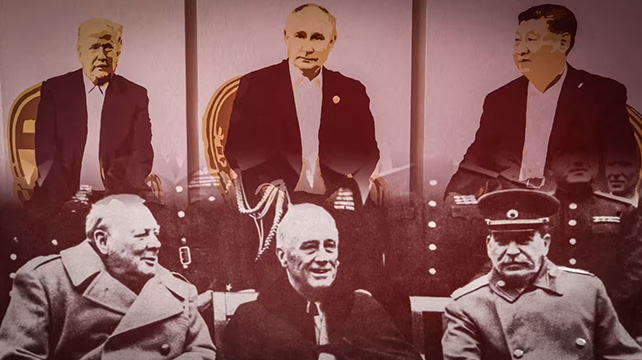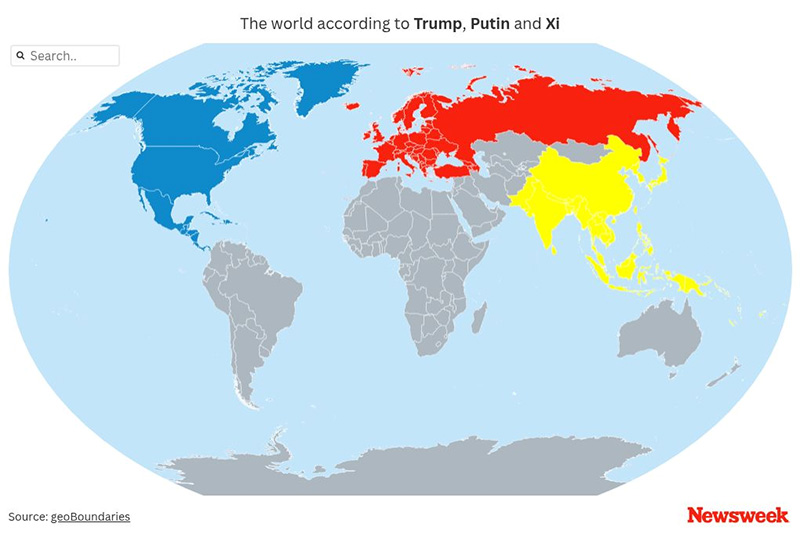 Photo: ft.com
Photo: ft.com
‘Newsweek’ shows the outlines of the global agreement “New Yalta”. In 1945 in Yalta, in Crimea, the leaders of the USSR, USA and Britain – Stalin, Roosevelt and Churchill - agreed on the post-war world order. Now the magazine writes about a possible new reorganization of the world order after the current global crisis, world trade war and confrontation between Russia and Europe.
U.S. President Donald Trump's outreach to Russian President Vladimir Putin to try to end the war with Ukraine comes amid jockeying among leaders for spheres of influence while China seeks to exert its clout. A map by Newsweek outlines how this global chess game might play out.

A Trump call with Putin in March and American-led shuttle diplomacy in Saudi Arabia showed the resolve of the U.S. president, even as the war rages on despite talks yielding a 30-day ceasefire proposal and a deal to stop Black Sea strikes.
But the process to end the war has echoes of the Yalta conference in 1945 between U.S., U.K. and Soviet leaders that preceded the Cold War division of Europe, according to Vessela Tcherneva, deputy director the European Council on Foreign Relations (ECFR). "Yalta was about great powers deciding about the future of Eastern Europe," she told Newsweek. "This is what it looks like regarding Ukraine now," she added.
Stefan Wolff, professor of international security at the University of Birmingham in England believes the current U.S. president sees the world as one in which great powers carve out spheres of influence which they don't interfere in.
“We are probably going to see superpowers divvying up the globe between them — China and the U.S.”
Munich was the scene of U.S. Vice President JD Vance's excoriation of the EU's democracies over accusations of silencing free speech and failing to stop mass migration as well as his demands for more openness to right-wing populists that was praised by Putin's ally, former Russian President Dmitry Medvedev.
The speech followed U.S. Defense Secretary Pete Hegseth saying restoring Ukraine's territory to pre-2014 borders was unrealistic and that European countries needed to do more for their own defense as the United States needed to counter China in the Pacific.
Tcherneva said the Trump administration's stance suggests Eastern Europe may be cast adrift, which is concerning given Russia's sway in the domestic politics of countries like the Czech Republic, Slovakia, Bulgaria, Romania and Poland.
Trump has repeatedly said he wants to acquire Greenland and take control of the Panama Canal, angered Canada by describing it as a potential 51st state and renamed the Gulf of Mexico to reflect his American-first philosophy.
Wolff said Trump is retrenching to the Western Hemisphere but may face push-back from China, particularly in Latin America.
"That's going to probably encourage Trump to focus even more on the Western Hemisphere and ditch whatever he thinks are pointless liabilities that he has elsewhere," he said.
There is the also question of whether there will be an arrangement between the U.S. and China over Taiwan, the autonomous island that Beijing considers to be a rebel region that must be reunited with the mainland, by force if necessary.
"You could have those tacit arrangements where the Chinese push and the U.S. doesn't push back," Wolff said. "Then it becomes clear that there is an implicit recognition that really the South China Sea is China's to play with."
…Yes, there is something new in the air of world politics, if even such an influential magazine as ‘Newsweek’ makes its significant predictions of such a kind.
read more in our Telegram-channel https://t.me/The_International_Affairs

 11:29 16.04.2025 •
11:29 16.04.2025 •






















